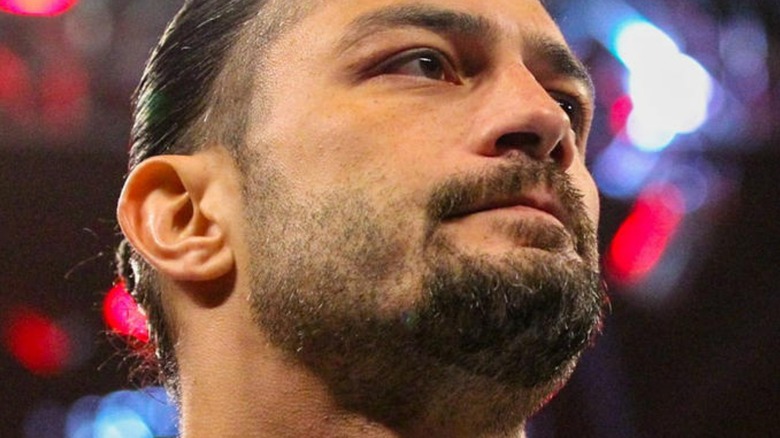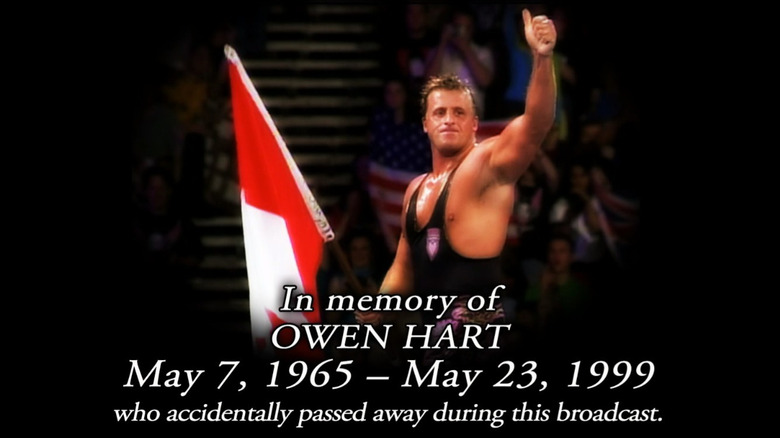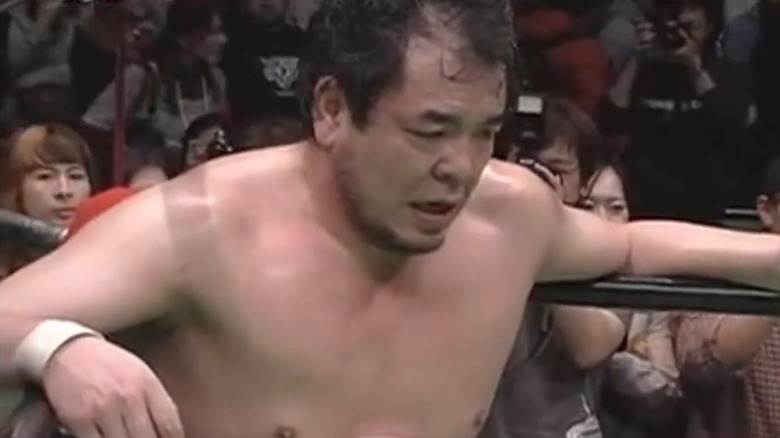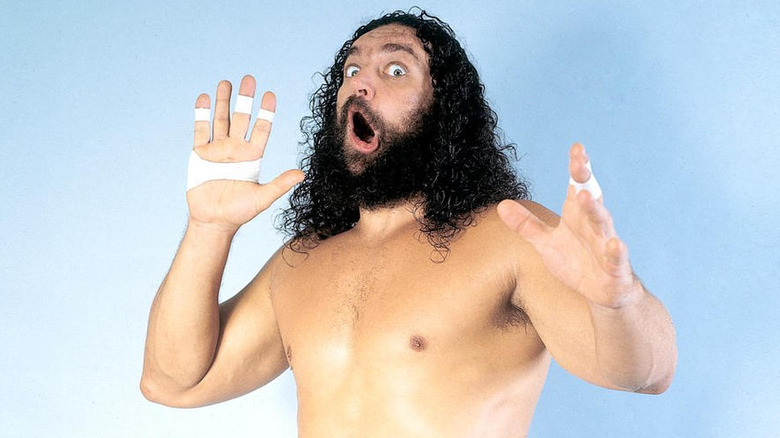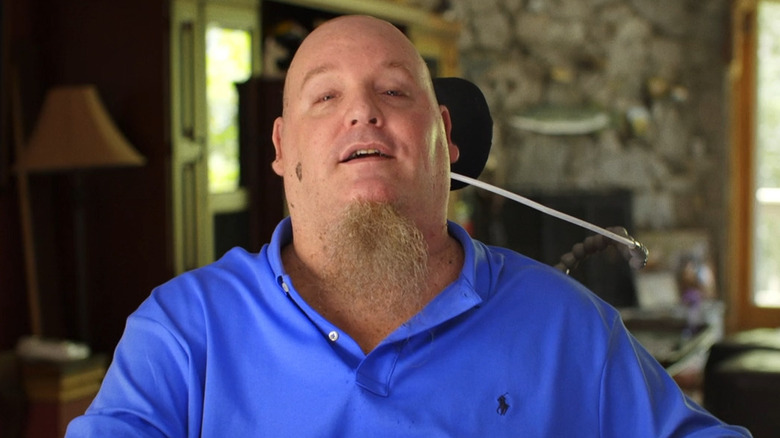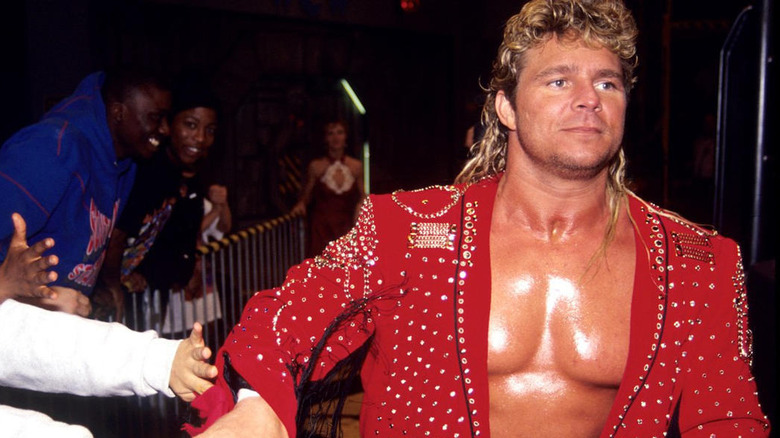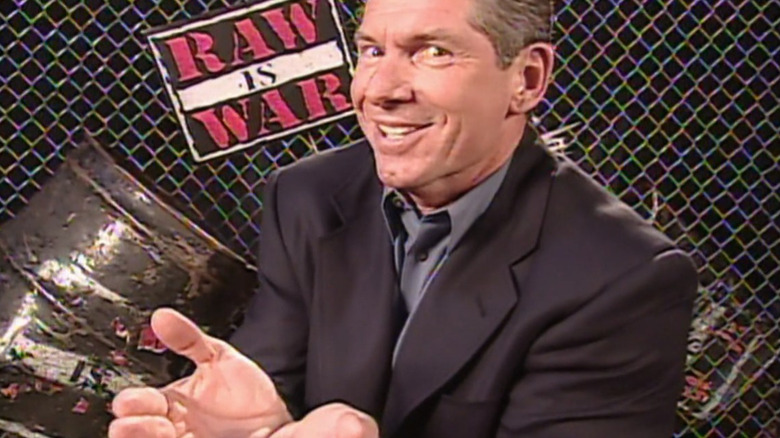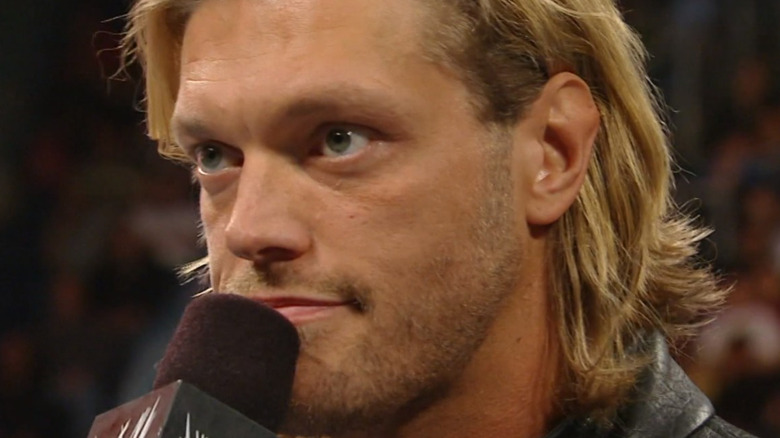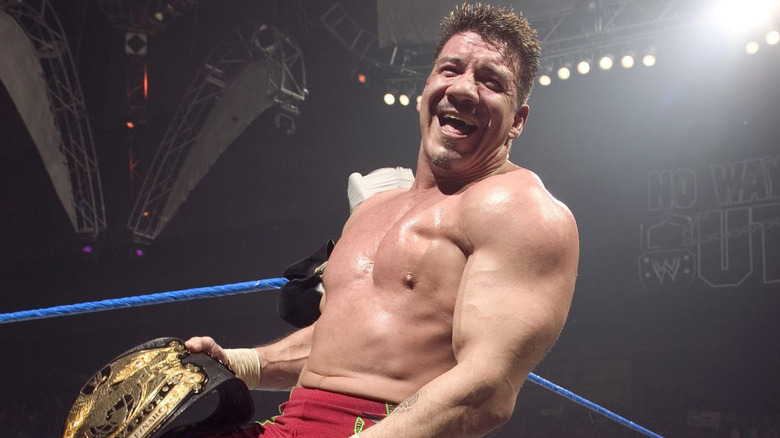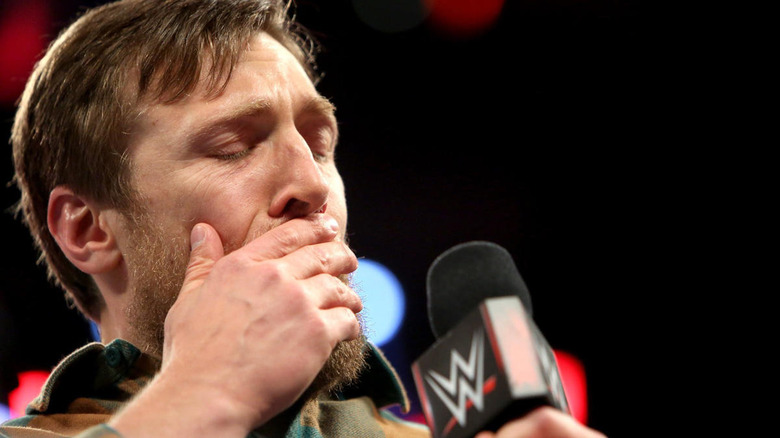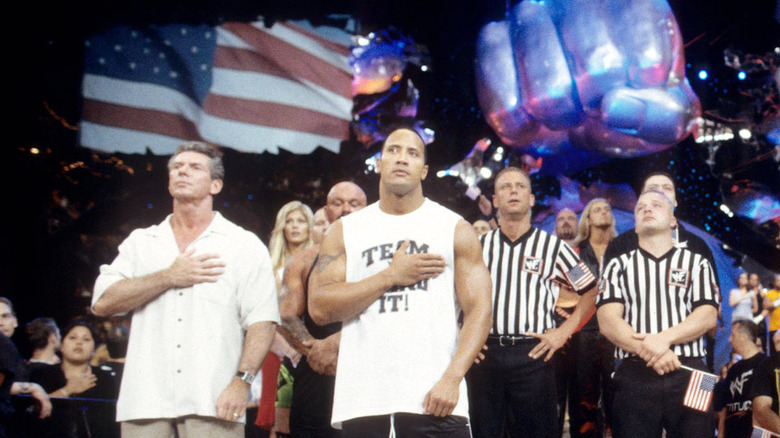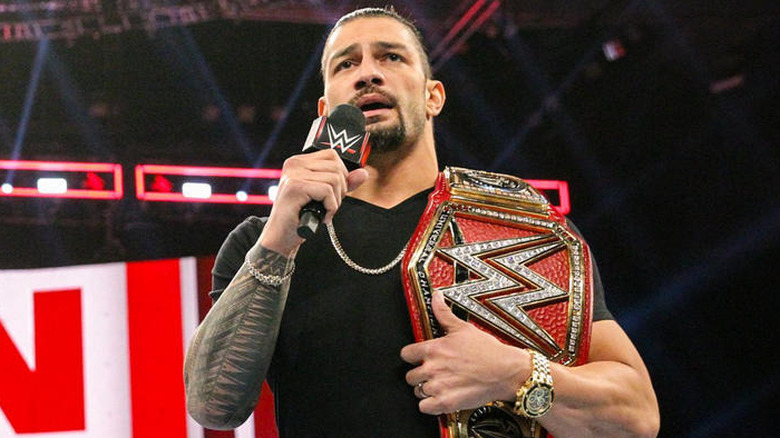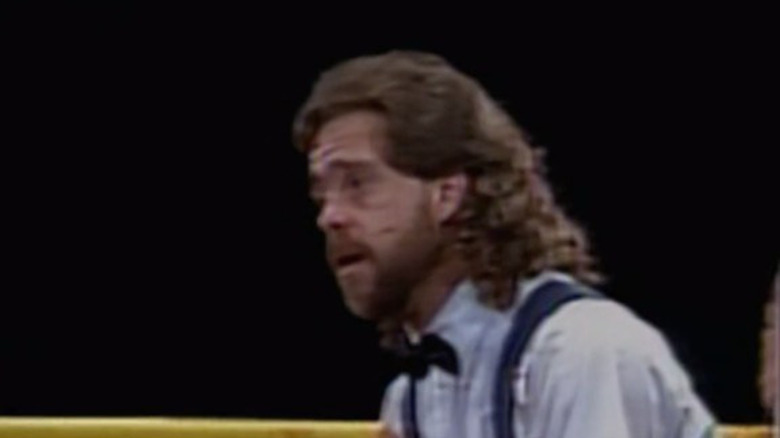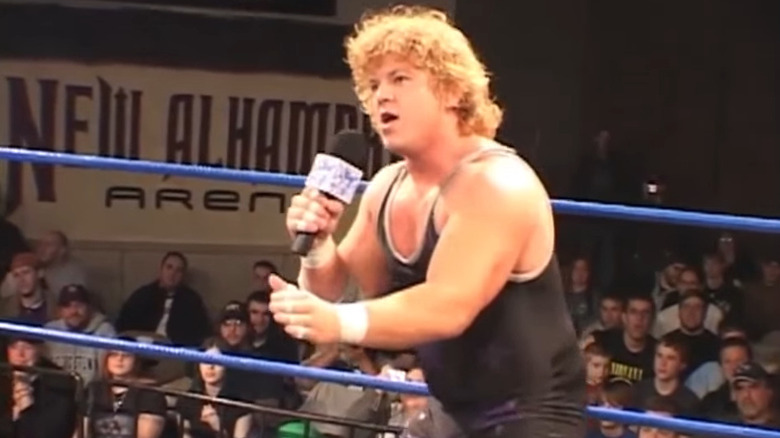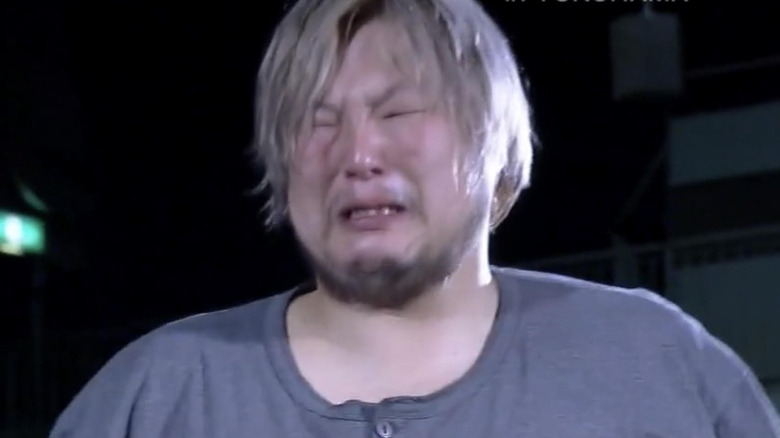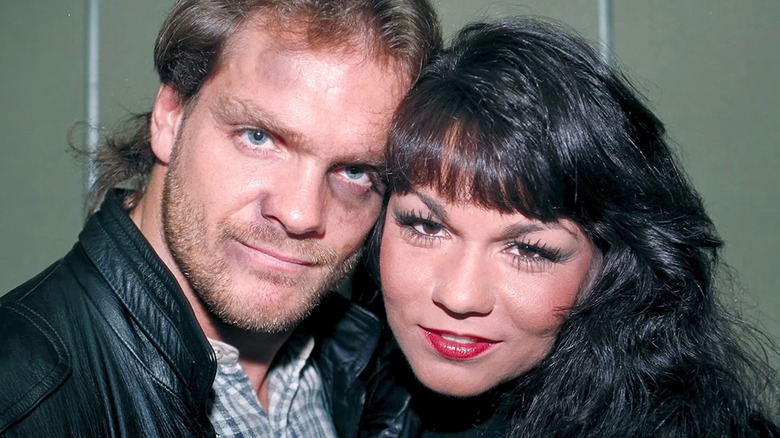The Most Tragic Moments In Wrestling
Though presenting its stars as nigh-invincible superhumans, the wrestling industry has seen numerous tragedies over the years. Wrestling is a live exhibition where anything can go wrong for the performers. The human body wasn't engineered to endure the physical toll of the sport, where scripted spots can leave someone with life-altering injuries.
Wear and tear on the road can lead to substance dependency to cope with depression, bodily pain, and sleep deprivation. Addiction is a leading contributor to industry death tolls, whether they'd be from overdoses or incidents while under the influence. No other form of entertainment or sport features such a high mortality rate with 2022 seeing several stars pass away from a variety of causes. Charity supercards and memorial shows dedicated to fallen wrestlers are all too common, with rival organizations sometimes banding together to pay tribute.
Often presented in a bubble for spectators to seek refuge from the harsh realities of life, wrestling shows are subject to change as real world tragedy can alter the product. Untimely deaths can lead to on-the-fly adjustments made at an event and could even alter long-term booking developments.
To put on a grand performance in the face of tragedy, personal or professional, is no easy feat. In spite of the problems faced by them behind the scenes, pro wrestlers still leave it all in the ring to help the audience have a good time and leave the show satisfied. In no particular order, here are 15 of wrestling's most tragic moment.
Owen Hart's Fall
Repackaged as the Blue Blazer, Owen Hart led a crusade against the crass attitudes the WWF was adopting. Challenging The Godfather for his Intercontinental Championship at Over the Edge 1999, Blazer was booked to reclaim the title he once held under his King of Harts persona. Dangling from the rafters, Hart was supposed to perform a stunt where he'd swoop in from the heavens to comedic effect, as seen at Survivor Series 1998. Due to an equipment malfunction, however, he plummeted to the ring below. The pay-per-view broadcast was disrupted as medical officials tended to the critically injured Hart. Later, Jim Ross notified fans of what had just transpired and later announced Hart's death. The event continued with live fans not being updated on Hart's condition.
WWF held the "Raw is Owen" special in memory of Hart the next night. In a "WCW Nitro" match dedicated to his brother, Bret Hart defeated Chris Benoit via submission.
On the "Dark Side of the Ring" episode exploring the fall, Owen's widow Martha expressed that the event should've stopped as the site of a fatality. Martha filed a wrongful death lawsuit against the WWF and the stunt team hired for the segment. The proceedings found that Owen was provided unreliable gear meant to be used in yacht racing. Hart's estate was granted an $18 million settlement in November 2000. The Owen Hart Foundation was launched a month later by Hart's family.
Mitsuharu Miswa's Death
One of All Japan Pro Wrestling's Four Pillars of Heaven, Mitsuharu Misawa began wrestling as Tiger Mask II after returning from North America in 1984. After unmasking, Misawa rose to stardom under his real name and became the company's ace throughout the 1990's. In 2000, he led a talent exodus and began Pro Wrestling NOAH. Neck injuries and other unhealthy habits resulted in Misawa's physical deterioration. Rather than getting surgery, as reported by Wrestleview, he pushed through with acupuncture and chiropractic procedures. As the founder and top draw, Misawa kept the company afloat in trying times.
In June 2009, Misawa and Go Shiozaki took on GHC Tag Champions Bison Smith and Akitoshi Saito in a title match. Saito performed a back suplex on Misawa, who became paralyzed upon crashing on the mat and went unconscious. The official called for the bell and Misawa was tended to by the roster and medical officials. Takeshi Morishima issued a statement calming fans and the show continued. Misawa died from cervical spinal injuries, the result of years performing the often dangerous King's Road style.
Saito was subject to a harassment campaign blaming him for Misawa's passing, told in an article translated by Noah's Arkive. Misawa's funeral was attended by colleagues, with mourning from all over the industry. WWE issued a statement in mortem of Misawa despite never signing him and CM Punk wrestled on "Raw" with Misawa's name etched on his taped wrists.
Bruiser Brody's Death
Finding work in the bloodthirsty hotbed of Puerto Rico, Bruiser Brody performed for Carlos Colon's World Wrestling Council in the late 1980s. Among the locker room was José González, who worked in the territory as the masked Invader 1. Years earlier, the two had wrestled elsewhere with the megastar Brody beating down the then-rookie. A vengeful González reportedly vowed to kill Brody for taking liberties on him.
Tony Atlas claims after González led Brody to the shower for a discussion, he heard moans of agony and found González standing over him with a bloody knife. Medical responders tended to Brody, having trouble commuting due to traffic surrounding the venue. Brody succumbed to his injuries and died.
In court, jurors were presented footage depicting Brody in his kayfabe persona — an unhinged, imposing madman. (The real Brody, born Frank Goodish, was shown to be well-spoken and articulate when not in character.) The murder weapon was lost, likely disposed of. González was be acquitted of all charges. Days after the verdict, Atlas and Dutch Mantel received their subpoenas to testify in the mail.
AJPW held the Bruiser Brody Memorial Show with the Goodish family present. Stan Hansen, who met Brody in college, gave a eulogy at the two year anniversary show. VICE produced a "Dark Side of the Ring" episode tackling the case and the sham trial that followed. González has wrestled as recently as August 2022, according to Cagematch.
Droz's Accident
In October 1999, Darren "Droz" Drozdov worked with D'Lo Brown during a "SmackDown" taping in Uniondale, New York. Having faced each other previously, the match was business as usual until the finish when Brown performed his signature "Sky High" sitout powerbomb and something clearly went wrong. The match ended in a no contest, and Droz was taken to the hospital with life-saving neck surgery leaving him a quadriplegic. The original recording of the accident is stored away in the WWE's archives, likely to never be made public. The footage has only ever been used in a disclaimer warning viewers to not mimic the risks taken by trained wrestlers.
Drozdov holds no animosity towards Brown, going on to say "I have no hard feelings toward D'Lo because s**t happens," in a December 2014 Fox Sports article penned by Jim Ross. In a shoot interview by Title Match Wrestling, Brown called the incident the worst day of his personal and professional life.
Thanks to modern medical research, Droz has regained partial mobility above his waist. Droz continued to find work after retirement in the writer's room and produced online content such as pay-per-view predictions for WWE. He was often a guest on the "Byte This!" webshow. Droz now lives in New Jersey with his sister's family, requiring round-the-clock medical care. Becoming close friends after living together at the University of Maryland, Under Armor founder Kevin Plank provided Drozdov with a state-of-the-art wheelchair to help fulfill his passion of hunting.
Brian Pillman's Death
A former Cincinnati Bengal, the controversial "Loose Cannon" Brian Pillman signed with the WWF in 1996 after a major car accident left him with a broken ankle. The injury forced Flyin' Brian to change his in-ring style, wrestling a more ground-based approach once he healed up. Pillman grew dependent on pills and alcohol to cope with his pain, making him even more erratic backstage.
Pillman was found dead of a heart attack at 35 years old by hotel housekeepers before In Your House: Badd Blood in October 1997. It was later disclosed that Pillman suffered from the same undetected hereditary heart defect that killed his father years earlier. Terri Runnels revealed that Pillman was in bad shape the night before his passing, handling her roughly during a house show match versus Goldust. She described him as being in a crabby mood without a ride to the next town, with her then-husband Goldust refusing to let the unpredictable Pillman join them. Pillman was booked to face Dude Love at the show, but the card was adjusted due to this. Vince McMahon announced Pillman's death in the pay-per-view's opening.
A special tribute was held in memory of Pillman the next night on "Raw," with friends such as Steve Austin paying their respects. McMahon interviewed a shaken and newly-widowed Melanie Pillman, asking her questions about what the future holds for her family. The Wrestling Observer Newsletter Awards distinguished the interview as the "Most Disgusting Promotional Tactic" of 1997.
If you or anyone you know needs help with addiction issues, help is available. Visit the Substance Abuse and Mental Health Services Administration website or contact SAMHSA's National Helpline at 1-800-662-HELP (4357).
The Closure of WCW
In March 2001, AP News reported Turner Broadcasting's cancellation of WCW programming across its networks. Eric Bischoff had tried to buy the promotion with plans of a reboot, but the deal fell through.
Buff Bagwell recalled pulling into the venue for that night's "Nitro" event and seeing WWF production trucks. After much scrambling backstage, Bagwell claims that Shane McMahon made a short announcement revealing that WCW had been bought out by their northeastern rivals. As to why he saying he was there, Bagwell quoted Shane as saying "We're going to hire some guys, we're going to fire some guys." John Laurinaitis, who joined the creative team the previous year, described being bombarded with questions by performers whose livelihoods were put in precarity.
Fans watched in awe as the final "Nitro," subtitled "Night of Champions," opened with Federation Chairman Vince McMahon revealing he acquired his own competition. In the end-show simulcast, Vince paraded his victory until it was revealed that his son Shane had (in kayfabe) bought the territory.
Many contracts would be bought out, while those unsigned found work in rising startups or retired. Technically, this wasn't the final WCW broadcast as an episode of "Worldwide" aired later that week. Nonetheless, it was the last pro wrestling event on Turner airwaves until the pilot of "AEW: Dynamite" in October 2019. The closure of WCW marked the end of the late 1990's boom period in American wrestling, leading to the WWF, later WWE's domination of the market.
Edge's Retirement
Debuting for the WWF in 1998, Edge rose up the card from an innovative tag team competitor to a main event act by 2011. As the Rated-R Superstar, he became an 11 time world champion and successfully defended the World Heavyweight Championship at WrestleMania XXVII against Alberto Del Rio.
A week after the event, Edge announced his retirement due to "stenosis of the spine," as stated by WWE. With a history of neck injuries stemming from a 2003 "SmackDown" match with Eddie Guerrero, physicians assured Edge that a forceful enough fall could kill him. On "Raw," Edge closed off the show with a promo thanking fans for a career he dreamt of since childhood. In light of his retirement, the World Heavyweight Championship was vacated.
In a post-broadcast promo, John Cena commented on the segment saying "He was one of those guys who was born to do this." Bruce Prichard discussed the sudden retirement and Edge's love for the wrestling business saying "I know that's a big piece of him, that's a lot of his identity."
In an interview with Kurt Angle in 2021, Edge described not retiring on his own terms and yearning to be cleared. As the 21st entrant in the 2020 Royal Rumble match, Edge made his surprise return after being cleared to perform under consultation of spinal specialists. Edge wrestles today for the "Raw" brand and recently discussed his hopes to retire in front of a hometown Toronto crowd on his own terms.
Eddie Guerrero's Death
Eddie Guerrero was a member of the esteemed Guerrero wrestling family, a lineage of influential North American wrestlers. Sent to rehab for a painkiller addiction by the WWF in May 2001, Guerrero sat out the entire Invasion angle and was released in November after a DUI arrest. After a sobering tour of the indies, Guerrero made his return in April 2002 and won the WWE Championship at No Way Out 2004. Then, on November 13, 2005, he died suddenly.
On "Dark Side of the Ring," Chavo Guerrero recalled being awakened by hotel management as Eddie hadn't answered his wake-up call. After jimmying the door open, they found him unresponsive in the bathroom. Eddie died in his nephew Chavo's arms from heart failure. WWE issued a corporate statement announcing Guerrero's passing and held the following "Raw" in his memory.
Jim Ross was interviewed by The Oklahoman, praising Guerrero's talents saying "He could have a main event level match with anyone." The article noted the pressures Guerrero faced as SmackDown's top champion, mounted on by health problems. On "Cafe de Rene," fellow "SmackDown" Six wrestler Kurt Angle recalled dragging Guerrero through a lumberjack match. The normally gifted Guerrero struggled from spot-to-spot, being pushed along by Angle.
Guerrero is survived by his wife Vickie, their two daughters, and a daughter from another relationship. Plans were reportedly being put in place for Guerrero to face Shawn Michaels at WrestleMania 22. Instead, Guerrero was inducted into the Hall of Fame's Class of 2006 that weekend.
If you or anyone you know needs help with addiction issues, help is available. Visit the Substance Abuse and Mental Health Services Administration website or contact SAMHSA's National Helpline at 1-800-662-HELP (4357).
Daniel Bryan's Retirement
After being pulled off a European tour and his "Extreme Rules" title defense was canceled, Daniel Bryan was stripped of the Intercontinental Championship due to injury. Vowing to wrestle again, Bryan wasn't cleared to compete by company doctors despite being cleared by other sports physicians.
In February 2016, Bryan announced his retirement in front of a crowd of his fellow Washingtonians. Citing concerning cerebral scan results, Bryan thanked the fans for being there with him in a career he started at 18 years old. Bryan credited wrestling for leading him to meeting, and eventually marrying, his wife Brie Bella. When discussing the possibility that he would no longer being an active wrestler moving forward, Bryan's voice cracked with heartbreak. In spite of that, the segment closed with Bryan and the crowd sharing one last "YES!" chant. In the audience, a future Aubrey Edwards is shown crying and would go on credit the moment with making her want to join the wrestling business.
In an ESPN interview held by fellow WWE alum Jonathan Coachman the next day, Bryan described nearly breaking down seeing his family ringside, saying "I was trying to get through it without crying." Brock Lesnar tipped his hat off to Bryan for prioritizing his health over wrestling saying his retirement was "a wise choice."
Cleared to wrestle in February 2018, Bryan returned to competition at Wrestlemania 34 – held in the same venue he won the WWE World Heavyweight Championship in three years earlier.
WWF SmackDown: 9/11 Tribute Show
Following the September 11th attacks, various sports organizations canceled or delayed their outings citing safety concerns, including WWF programming. Usually taped on Tuesdays, that week's "Smackdown" broadcast was postponed to Thursday. Live from Houston, Vince McMahon opened the show with a speech to rally the somber crowd. Lillian Garcia sang "The Star Spangled Banner" with both factions of the ongoing Invasion angle surrounding the ring. Weaved in the broadcast, several talents gave statements reflecting the events of the past few days. In the main event, Kurt Angle beat Rhyno to close the show on a patriotic note. The Rock defeated Steve Austin via DQ in a post-broadcast match.
The talent gave statements during the show. During her talking head video, Stephanie McMahon compared the attacks to her father's 1994 steroid trial. The segment went on to win the annual Wrestling Observer Newsletter's "Most Disgusting Promotional Tactic" award.
In the 20th anniversary of the attacks, "Never Forget" was released exploring the production of the episode featuring accounts from on-screen talent and backstage personnel. Vince described the event as "a moment for everyone ... it brought our country together. I'm so proud to be an American." On "Grilling JR," Jim Ross called Vince's speech "the most significant promo he ever did."
Roman Reigns' Leukemia Diagnosis
In October 2018, WWE Universal Champion Roman Reigns relinquished his title and announced he would be taking time off due to leukemia treatment. Leaving the title in the ring, Reigns was greeted by his former Shield stablemates Seth Rollins and Dean Ambrose, who embraced him at the top of the entrance ramp. Reigns was first diagnosed with the illness at 22 after a physical while signed to the Minnesota Vikings.
Once rejected for his two-dimensional Superman persona, fans and colleagues wished Reigns the best. Paul Heyman offered his thoughts and prayers to Reigns, describing himself as being "in the presence of such courage and such greatness."
Small pockets of the wrestling fanbase accused the company of fabricating the diagnosis, with Reigns publicly denying the baseless claims. In February 2019, Reigns announced that he was in remission. Returning in a six-man tag match, Reigns main evented Fastlane 2019 with his Shield brethren to defeat Baron Corbin, Bobby Lashley, and Drew McIntyre. During the COVID-19 Pandemic, Reigns' immunocompromised status led to him missing the first few months of Thunderdome tapings before returning at SummerSlam.
Reigns is a spokesperson for The Leukemia & Lymphoma Society.
Brian Hildebrand's Death
Brian Hildebrand, better known as Mark Curtis, got his big break refereeing for Smoky Mountain Wrestling. Hildebrand was told by doctors that he was afflicted with stomach cancer in October 1997. While fighting his illness, Hildebrand continued working as a referee for WCW. On September 8, 1999 Hildebrand died in his home in Talbott, Tennessee. On his podcast, former SMW colleague Jim Cornette discussed his history with Hildebrand, stating that "He was there to help, always worked hard, and loved the wrestling business."
Hildebrand's death was announced by WCW on the "Thunder" broadcast the day after his death with the episode being commemorated in his memory.
A benefit supercard known as Curtis Comes Home was held in summer 1999 with the proceeds used to pay for part of Curtis' treatment. The event featured wrestlers contracted to ECW, WCW, and WWF, the latter two companies allegedly covered for talent transportation costs. Chris Jericho's book "A Lion's Tale" features a photo of Jericho, Hildebrand, and other friends after the show. A Reunion was held in 2005, the profits being donated to the Children's Miracle Network.
The "Mark Curtis Memorial Weekend of Champions" was sanctioned annually from 2000 to 2003 by Southern States Wrestling. The Mark Curtis Fantasy Camp was held in 2001 as a training event featuring Bill DeMott, Les Thatcher, and Ricky Steamboat.
Larry Sweeney's Death
Larry Sweeney came to prominence in several independents across the Eastern Seaboard. Playing an eccentric and flamboyant smooth-talker, Sweeney was a throwback to the coked-up personalities of the 1970s. Aside from wrestling in his home promotion of CHIKARA, Sweeney was a successful heel manager. In 2006, he signed with Ring of Honor and formed Sweet 'n' Sour Inc. featuring Chris Hero and Sara Del Rey.
In April 2011, Sweeney was found dead at 30 years old in a Louisiana wrestling school in what was ruled a suicide. Wrestleheat reports that Sweeney had lived with bipolar disorder and experienced a breakdown in 2009. Following the news, Hero tweeted "We lost a dedicated friend and an overwhelmingly talented performer this morning." ROH issue a statement giving their condolences to Sweeney's friends and family.
The Chicago Tribune published an obituary for Sweeney, real name Alexander Whybrow, who is survived by his parents and two siblings. The Whybrow family asked that any donations be made to Thresholds, a mental health and substance abuse support organization.
Eddie Kingston, who feuded with Sweeney and became a close friend in their travels, was crowned the inaugural Chikara Grand Champion at the 12 Large: Summit memorial event. In light of National Suicide Prevention month, Kingston spoke to Sports Illustrated about his friend saying "He'd be a multimillionaire if he were still here ... he'd be with us in AEW."
If you or anyone you know is having suicidal thoughts, please call the National Suicide Prevention Lifeline by dialing 988 or by calling 1-800-273-TALK (8255).
Takeshi Morishima's Retirement
Clocking in at 6'3" and over 130 kilos, Takeshi Morishima's monstrous aura drew parallels to King's Road pioneer Terry Gordy. He held the GHC Heavyweight Championship three times, dethroning Mitsuharu Misawa in the founder's final reign. In his North American invasion, he feuded with Bryan Danielson in a brutal trilogy of matches and reigned as ROH World Champion. He even had a WWE tryout, but wasn't signed.
Superluchas reported Morishima's withdrawal from the Global Tag League in April 2015 due to injury. Per The Wrestling Observer, Medical tests on Morishima's blood found "abnormally high glycated hemoglobin, which could lead to diabetes." Although a homegrown star with corporate responsibilities, Morishima retired at 37 under doctor's advice. He appeared at NOAH's Great Voyage in Yokohama show in May, sobbing down the aisle and giving a tearful speech in front of a recorded 3,500 fans. Morishima's Choukibou-gun stablemates shared the ring with him, giving kind words to their departing leader. Solo Wrestling reports that Morishima listed waning physical and mental health, rather than diabetes, as leading to his retirement in an interview with Tokyo Sports.
Morishima announced his comeback in the Riki Choshu-helmed Genesis show in Kouroken Hall set for October 2018. He withdrew from the event, which would later be cancelled, due to arthritis surgery in his foot (translation provided by Noah's Arkive).
In retirement Morishima has reportedly struggled financially, panhandling at indie shows.
The Chris Benoit Tragedy
A world-travelled performer two decades into the business, Chris Benoit was regarded by colleagues as a professional and devout family man. In June 2007, Benoit was scheduled to face CM Punk at "Vengeance: Night of Champions" to crown a new ECW Champion. Benoit was uncharacteristically absent from the house show loop leading up to the pay-per-view, telling Chavo Guerrero his family were ill with food poisoning. WWE requested a wellness check as bell time approached, as Benoit had missed his flights. Atlanta police found Benoit, his wife Nancy, and their son Daniel dead in a grisly double murder-suicide.
Close friends and relatives were left wondering how such a terrible thing could happen. TMZ reported that the Benoits' nearly divorced in 2003, with Nancy filing a restraining order. Benoit's name blipped on DEA radars after discovering he was connected to a steroid distribution network, as reported by The Oklahoman. Evidence suggests CTE, substance abuse, domestic problems, and mental health issues contributed to what transpired that weekend.
Sportskeeda and others credit the crisis for muddying the company's reputation, which shifted its focus to family-friendly content. The Wellness Policy is enforced to prevent another contracted wrestler's untimely passing. Since the incident, WWE has scarcely mentioned Benoit with his legacy dividing the wrestling world. Many advocate for his celebration while others oppose. At an Inside the Ropes event, Paul Heyman said, "Three people died in that house that night. Only one person had the choice behind it."
If you or anyone you know is having suicidal thoughts, please call the National Suicide Prevention Lifeline by dialing 988 or by calling 1-800-273-TALK (8255).
